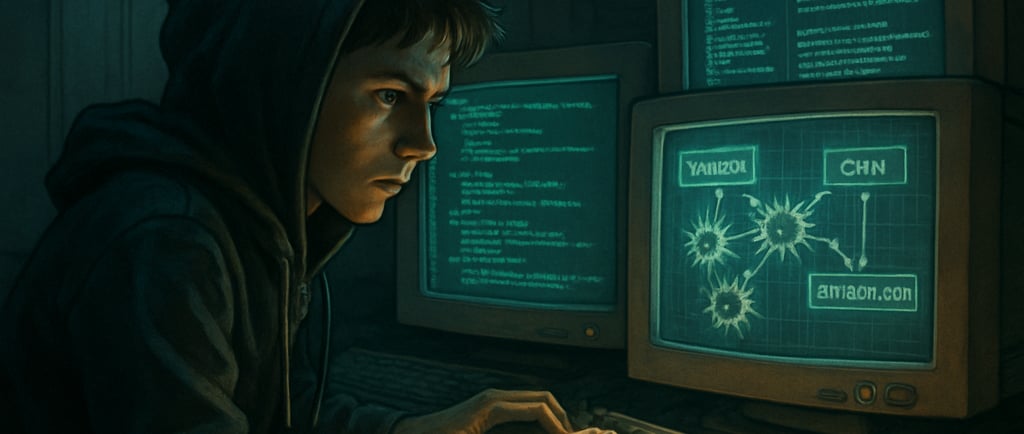
The Teen Who Broke the Internet
Michael Calce's Wake-Up Call
Shane Brown
9/12/20253 min read


The Teen Who Broke the Internet: Michael Calce's Wake Up Call
The Kid Behind the Keyboard
Michael Calce received his first computer at age six. His parents had divorced, and his father bought him the machine to keep him occupied during weekend visits to his Montreal condo. The computer gave young Michael something he craved: control.
"There was something intoxicating about the idea of dictating everything the computer did," Calce later said.
By age nine, he had hacked AOL to extend his free trial. By 15, he had joined TNT, an elite hacker group, and earned the nickname "Mafiaboy."
Project Rivolta: The Attack That Changed Everything
On February 7, 2000, Calce launched what he called "Project Rivolta" (Italian for "rebellion"). He had spent months compromising university networks, turning their computers into his personal army of "zombies."
His target? Yahoo, the world's biggest search engine at the time.
The attack worked. Yahoo went down for nearly an hour. Emboldened, Calce expanded his assault over the next week. He knocked offline eBay, CNN, Amazon, Dell, and E*Trade.
Six major websites. One teenager. The internet had never seen anything like it.
The Downfall: Bragging Rights
Calce's technical skills were impressive, but his need for recognition became his weakness. He started bragging about his attacks in IRC chat rooms. He even revealed details about hitting Dell before the attack had been publicly announced.
The FBI traced these digital breadcrumbs back to him. Surveillance vans appeared outside his Montreal home. In April 2000, authorities arrested the 15-year-old who had terrorized the internet.
The Government Response
President Bill Clinton convened the first-ever cybersecurity summit. Attorney General Janet Reno announced a manhunt for Mafiaboy. The attacks had shown that a teenager with basic skills could cripple major corporations.
"You know I'm pretty calm, but when you have the president of the United States basically calling you out and saying 'We're going to find you'... at that point I was a little bit worried," Calce admitted years later.
Legal Consequences
Calce pleaded guilty to 56 charges in January 2001. His age saved him from harsher penalties. The Montreal Youth Court sentenced him to eight months in juvenile detention, one year of probation, and restricted computer access.
Estimates of the damage ranged from hundreds of millions to over a billion dollars. The attacks had shaken investor confidence in the dot-com economy and exposed massive security weaknesses across the internet.
From Criminal to Consultant
After serving his sentence, Calce transformed his life completely. He became a "white hat" hacker, using his skills to help companies instead of attacking them.
In 2008, he co-authored "Mafiaboy: How I Cracked the Internet and Why It's Still Broken" with journalist Craig Silverman. The book won the Arthur Ellis Award for Best Non-Fiction, Canada's top crime writing honor.
Calce served as chairman of HP's Security Advisory Board for over five years. He founded his own cybersecurity firm and has worked with Fortune 50 corporations to strengthen their defenses.
The Lasting Impact
The Mafiaboy attacks marked a turning point for cybersecurity. Before 2000, most companies didn't understand DDoS attacks or have protections against them. Calce's assault forced organizations worldwide to take internet security seriously.
"Back then, the hacking community was all about notoriety and exploration," Calce explains. "Now hackers are motivated by money."
The attacks directly led to new cybercrime laws in Canada and influenced cybersecurity policy globally. Companies invested heavily in firewalls, intrusion detection systems, and DDoS protection tools.
Today's Warning
More than 20 years later, Calce warns that the internet remains vulnerable. Modern attacks are far more sophisticated, but the fundamental problems persist.
"We are obviously losing the war right now," he observes. "There are way more hackers than there are security professionals."
His story serves as both a cautionary tale about the dangers of cybercrime and proof that people can change their paths. The teenager who once terrorized the internet now dedicates his life to protecting it.
Sources
NPR All Tech Considered - "Meet Mafiaboy, The 'Bratty Kid' Who Took Down The Internet" (2015)
Wikipedia - "Michael Calce"
Black Hat Ethical Hacking - "MafiaBoy, the hacker who took down the Internet" (2022)
Infosecurity Magazine - "A Q&A with MafiaBoy" (2013)
All American Speakers - "Michael Calce Biography and Booking Information" (2024)
Innovate
Building websites and securing your digital presence.
Connect
Support
Info@sinistergatedesigns.com
© Sinister Gate Designs, LLC 2025. All rights reserved.
